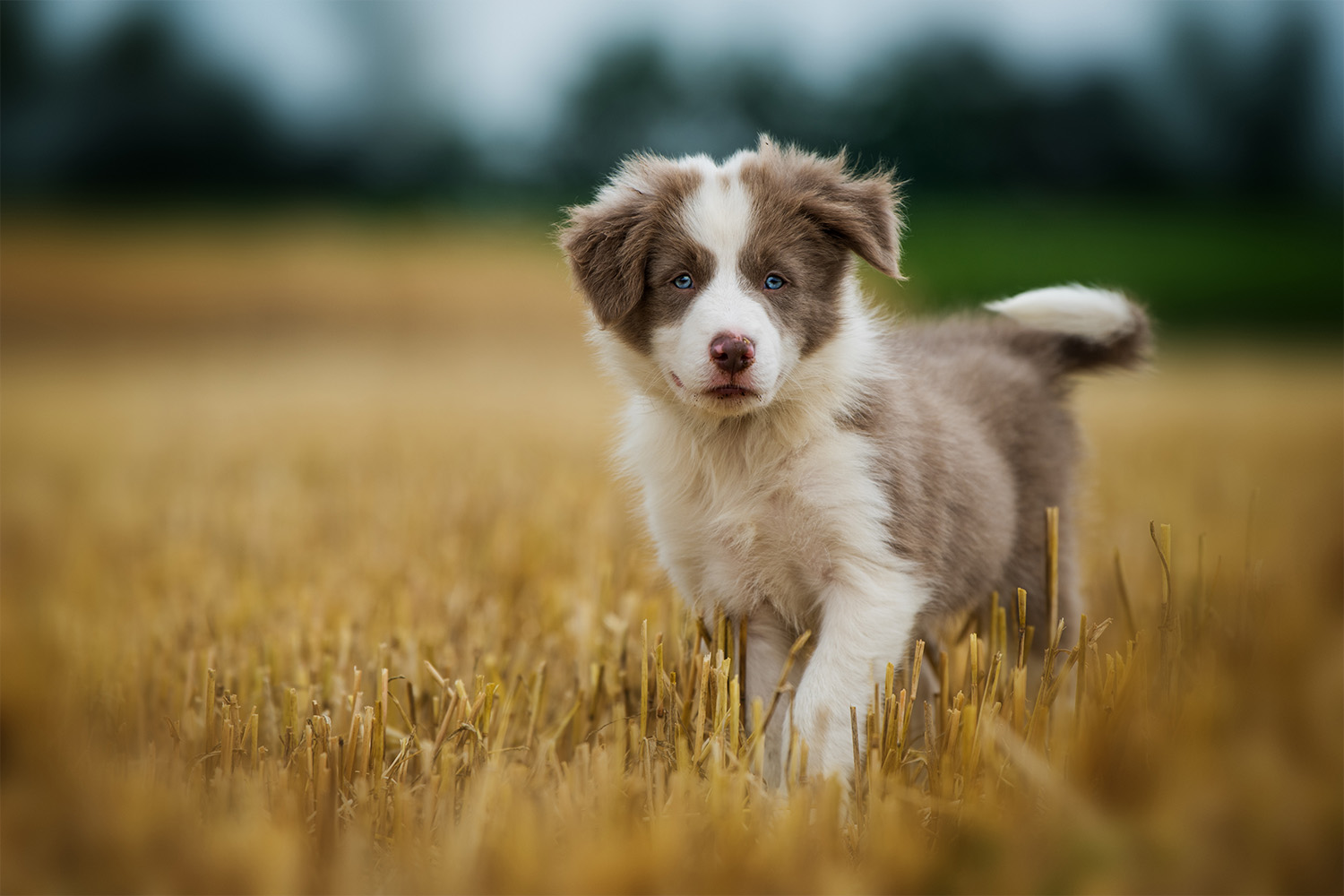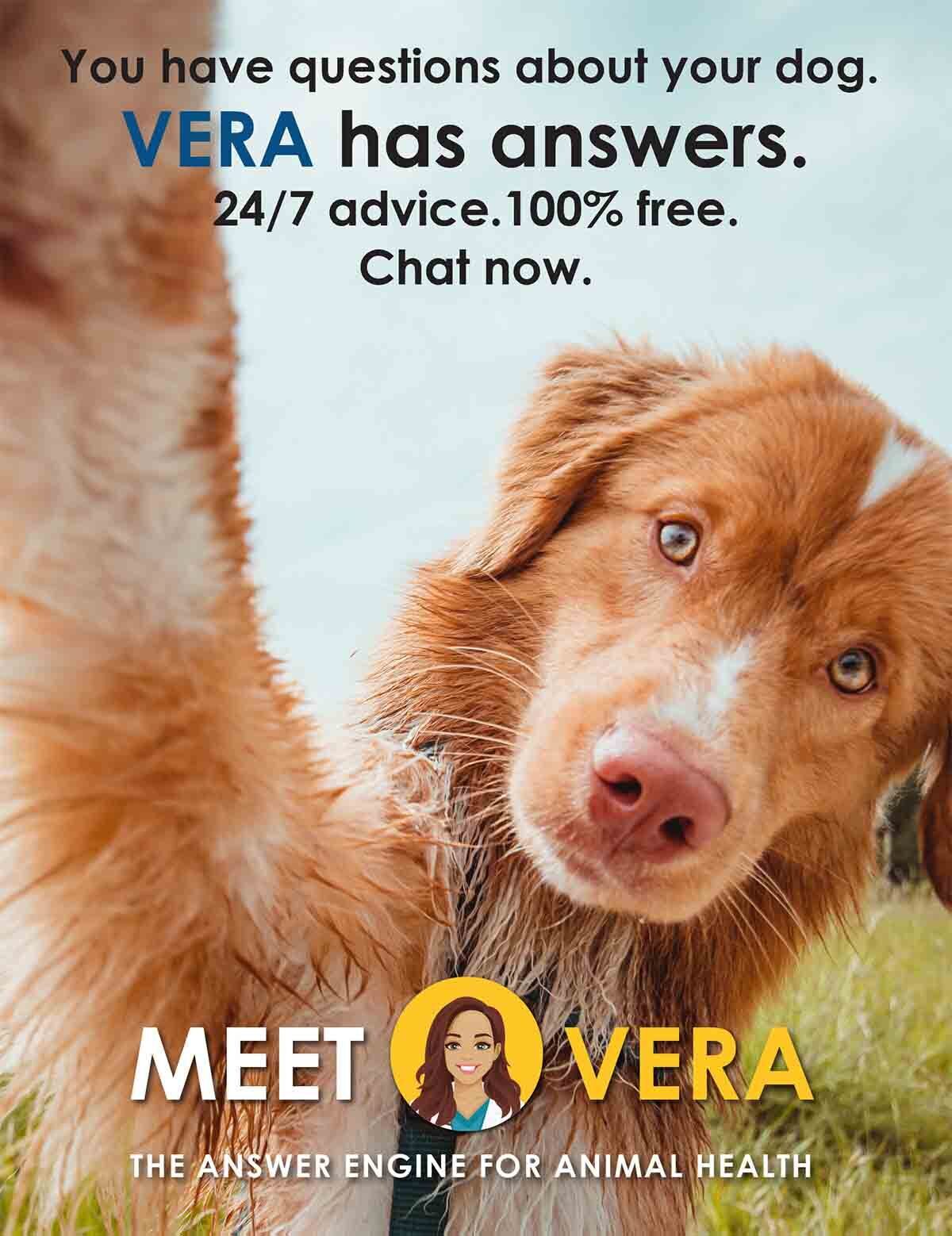If you’re the pet parent of a young dog, you might be wondering, “At what age will my dog be considered an adult?” You might be wondering this as your puppy chews your shoe or starts licking your face at 3 AM.
Generally speaking, puppies are considered adults at one year old. However, dogs mature at a different rate than humans do. Depending on the breed, they stop growing at various points in their life. We’ll discuss how to best navigate the transition from puppyhood to adulthood. Then, we’ll review what signs might indicate the beginning of adulthood for your dog.
Let’s get started!
Puppyhood Milestones
Puppies learn skills throughout the different stages of their development that are built upon in adolescence.
Join us as we review a general timeline and the puppyhood milestones that can influence your dog’s adolescent years.
Behavior: From Birth to Adoption
During the first seven to 13 weeks of their lives, puppies learn basic behaviors from their mother and littermates. These become the foundation for future interactions with other dogs. This includes showing submissiveness and exerting dominance appropriately, as well as being receptive to another dog’s cues and boundaries.
Puppies are not mentally mature enough to adjust to change until after seven weeks, so it is important that they stay with their litter until then.
Eight/14 Weeks: Time To Go Home!
At eight weeks, puppies are mature enough, both mentally and physically, to be adopted into their forever homes. However, many pet experts believe that 14 weeks might be a better age than the traditional eight-week mark previously used. This is the age where they are capable of bonding with you, and while they adjust to being in your home, you can begin training them.
Let’s discuss how you can help them through this transition:
Eight Weeks to Adolescence: What To Expect
When you first bring your pup home, it will take time for them to trust you. Training classes are a great way to bond with them; dogs are pack animals and thrive in a structured environment.
Puppies are energetic, and training will allow them to use their energy productively. Ideally, by the time they reach adolescence, they will rely on you for reassurance as they begin to gain independence.
You can also begin feeding them regular puppy food at eight weeks, as they would have been weaned off of their mother’s milk by this time. Check with your pup’s previous home to continue the food they were already on. We don’t want any upset tummies!
Sixteen Weeks: Training and Emotional Development
From the age of eight weeks to sixteen weeks, puppies begin to observe their surroundings more closely. Experiences during this stage, whether positive or negative, can strongly influence their perspective of the world around them.
The key to this period of their development is exposing them to many positive experiences while making negative experiences appear safe and positive. This can help ensure that their experiences (especially experiences that are necessary, such as vet appointments) do not have a lasting negative impact.
Now is the ideal age to start training your pup. They can easily learn commands as they have already begun to absorb information about their environment. During training, use positive reinforcement, such as rewarding them with treats when they follow instructions. This could lead to them associating a reward with following commands correctly, allowing them to understand more quickly.
Four Months to Adolescence
Before they reach adolescence, your dog might become less dependent on you and feel more confident. You can encourage puppies during this time by continuing to expose them to unfamiliar experiences to learn how to behave in different environments.
When Does Adolescence Begin?
The age at which adolescence begins varies between breeds, as certain dogs may develop faster than others. However, it usually begins between the ages of six months to one year for most dogs.
During adolescence, dogs can experience hormonal and behavioral changes that are often mistaken for general disobedience. Your dog’s adolescent stage is similar to a human’s teenage years, making this time extremely important for continued socialization and training.
Adolescent dogs are impressionable and motivated to learn new things but lack impulse control. Providing them with mental and physical stimulation can help keep them active.
Let’s talk more about what you can do to navigate this stage of your dog’s development:
What Does My Adolescent Dog Need?
Rather than trying to teach your adolescent dog to control their impulses, it is best to give them a variety of ways to utilize their energy. This can help keep them entertained, as they may want to be more active than they were previously. You might consider investing in different types of chew toys, puzzle toys, or rawhide bones to keep them occupied.
Taking them on long walks is another great way to ensure they can stay active regularly. The bottom line is that adolescent dogs need plenty of stimulation so that they can be well-adjusted to a wide range of environments and circumstances in adulthood.
Your Dog’s Physical Development
Now that we’ve discussed how your dog’s mental and emotional development may progress from puppyhood to adolescence, you might be curious about how they develop physically until they reach full maturity in adulthood.
Let’s learn more:
When Will My Dog Reach Full Size?
Dogs stop growing once they reach their full size in adulthood, but the amount of time this takes can vary based on what breed your dog is. It is important to understand when your dog will reach full size; different breeds have specific requirements for diet and exercise to help maintain their health.
Here are a few things to keep in mind if you’re wondering how big your dog will get:
Does One Size Breed Grow Faster Than the Others?
Large dogs usually take more time to reach full size because they have bigger bones that develop more slowly compared to small dogs. Most large dogs could continue growing until one year to 18 months old. Small dogs could reach their full size between six to eight months old.
Puppies of medium size breeds can stop growing once they are one year old. If your puppy is purebred, you can predict their potential adult size based on their breed and dog parents. By contrast, it might be more difficult to know your puppy’s full size if they are a mixed breed.
How Do I Feed and Exercise My Dog?
Your dog’s ideal diet and exercise routine can depend on age and breed size. Exercise is a crucial aspect of a dog’s health during puppyhood. Rigorous activity early on in their lives can damage bone and joint health in the long term.
A puppy’s diet differs from an adult dog’s, as puppies need a diet that supports their growth. Puppies who become obese could be likely to have health issues when they get older, so it is best to feed them a diet that keeps them healthy.
How Will My Dog’s Diet and Exercise Change After Puppyhood?
When it comes to diet and exercise, puppies who are still growing don’t have the same needs as fully developed adult dogs. Now that you know the advantages of giving your puppy a diet and exercise routine which benefits their long-term health, you’re probably wondering how these could change once they reach adulthood.
Let’s explore your dog’s needs further:
Nutrition in Puppyhood
Puppies and adult dogs need the same six essential nutrients in their diets, though the proportions of these can depend on your dog’s individual characteristics. All dogs need minerals, carbohydrates, vitamins, protein, fat, and water. Bowls of fresh water should be inside and outside so that your dog is always well-hydrated.
Puppy food with critical nutrients in the proper amounts is key to maintaining their health. All six nutrients are equally vital to their diet, as disproportionate amounts can impact both short-term and long-term health. So what happens if a puppy’s diet isn’t balanced?
How Diet Can Impact Your Puppy’s Health
An unbalanced diet can lead to several health issues for your puppy. Some possibilities can include inadequate calcium resulting in affected bone growth and immune system issues.
Nutrition and Exercise in Adulthood
Adult dogs have similar nutritional needs to puppies, but adult dogs can exercise more frequently without negative health consequences.
The amount and type of food you can feed your adult dog can be determined by their size, breed, and how active they are. Their activity level on a regular basis is important to their overall diet, as they need to replace calories lost during times of activity.
Knowledge Is Power: What To Know and Why
Now you know all about your dog’s development, milestones, and needs from puppyhood to adulthood. Why? Well, when you have an idea of the potential timeline for your dog’s growth, it can be easier to get supplies for them.
This includes items like leashes, collars, and harnesses that properly fit your dog as they grow. If you have the right supplies for them, they are less likely to become uncomfortable due to ill-fitting equipment. This can help training go smoothly, especially during puppyhood, when they might be more sensitive to unfamiliar textures and sensations.
Additionally, being aware of your dog’s development process can help you better understand your dog’s overall temperament. For instance, some dogs may be more active or energetic than others simply because of their breed.
Understanding your dog’s temperament could make it easier to train them and know how much training, stimulation, and enrichment they’ll need.
As Your Pup Grows Up
For more help navigating your dog’s transition from puppyhood to adulthood, you can become a member of the AskVet app for only $9.99 a month.
Certified Pet Lifestyle Coach™ can provide you with a personalized pet care plan for your pooch, 24/7 advice, and more. Schedule an appointment with a CPLc™ today and get started on growing with your pets!
Sources:
When Does My Puppy Finish Growing? How Long Do Puppies Grow? | American Kennel Club
Developmental Stages of Puppy Behavior | PAWS
Managing Your Adolescent Puppy | RSPCA
At What Age Should Puppies Be Brought to Their New Homes? | Psychology Today





